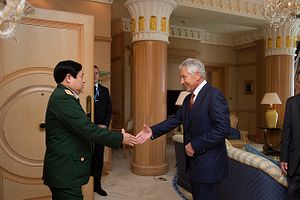The Socialist Republic of Vietnam is a critical component of the Asia Pivot – an emerging U.S. ally, a rapidly growing economy within ASEAN, and a militarily dynamic state that contests China’s claims in the South China Sea, particularly over the Spratly Islands. The justification for a military alliance between the United States and Vietnam is obvious: Vietnam occupies a strategically vital position along the western border of the South China Sea, and for this reason Washington’s interests in balancing China have coincided with Hanoi’s fear of its northern neighbor. There is a strong interest for both to cooperate as part of Washington’s broader containment strategy. This means that Vietnam could expect similar treatment from the U.S. that other strategically important partners in the Pacific Basin have seen – significant (and possibly unconditional) security guarantees to protect its territorial integrity.
It is important for the U.S. to retain strong ties with a coalition of allied states in the Pacific Basin and to ensure that they remain secure and prosperous, yet it is equally vital to avoid motivating any one of these junior partners to take an overly aggressive course of action, and thereby provoke a destabilizing response from Beijing. In the case of Vietnam, the recent US-Vietnam nuclear deal approved by the Senate Foreign Relations Committee represents one positive step towards solidifying such a coalition, though it is marked by long-term dangers that should be managed prudently. At this time, Vietnam participates in multiple confidence-building measures (including the Comprehensive Nuclear-Test-Ban Treaty, the Treaty on the Non-Proliferation of Nuclear Weapons, and Treaty of Bangkok) that seem to discredit the notion that the Socialist Republic is a proliferation danger.
Yet this does not mean that Vietnam has permanently renounced nuclear weapons. If the United States decides, given the military’s ongoing fiscal triage, to offload the costs of security onto its Asian allies through selective proliferation, Vietnam’s civilian nuclear ambitions (like those of Japan and South Korea) could conceivably escalate to include a military arsenal. Even under conditions of a perceived decline in the credibility of American security guarantees (due, for example, to failures in the United States’ grand strategy emanating from outside of the region), states such as Vietnam would possess powerful incentives to militarize their existing nuclear capabilities, and the corresponding diffusion of geopolitical decision making presents obvious dangers for regional stability.
Yet this has not dissuaded the United States from furthering its recent nuclear deal with Vietnam, albeit, and to the United States’ credit, with some attached constraining barriers to proliferation. It would be unwise to dismiss the dangers of a liberal approach to Vietnamese proliferation. While there may be “no reasons to doubt” Vietnam’s commitment to nonproliferation, assuming that current Vietnamese security policy will remain consistent in the future (a future that may include a considerably less benign China and a less committed United States) would be equally unjustified.
That said, the United States may have a justifiable interest in this approach. The temptation to depict the United States’ strategic partnerships in terms of classic “spheres of influence” risks oversimplifying very complex partnerships in which the interests of American satellites do diverge from the United States. Yet, in the case of Vietnam’s market for nuclear energy, there is reason to believe that great power politics are indeed motivating Washington’s decision to conclude a deal with Vietnam that does not explicitly prohibit enrichment.*
Russia was the first nation to assist Vietnam in its nuclear development. Taken in the greater context of Russia’s overtures towards Hanoi (particularly in opening naval access to the Cam Ranh Bay), this implies a nontrivial relationship between the two nations. Whether or not preventing the emergence of a bilateral relationship between Russia and Vietnam is a core strategic interest for the United States depends on which narrative of Russian grand strategy is actually true – that is to say, whether Russia is an actual peer competitor to the United States (in which case Vietnam is an area of contention in Putin’s ongoing rivalry with the West), or whether recent frictions in Ukraine can be explained by other factors (in which case Russia’s interests only incidentally conflict with those of the West). More important, however, is how the Vietnamese deal factors into Washington’s calculations (accurate or not) in the region, and it appears that those calculations do assume that Russia is “more of an adversary than a partner.” In this regard, the recent deal seems more complex than simple goodwill or an effort to leverage Vietnam against a rising China, but also a means of blocking rapprochement by what Washington at least perceives as a resurgent Russia. Navigating a successful partnership with Vietnam will require both an accurate assessment of the United States’ actual core strategic interests in the region, and policies to mitigate the unintended consequences such a partnership will risk.
*Several changes have been made to this article to reflect the fact that the deal with Vietnam is not an “enrichment deal.” Rather, the concern from a proliferation perspective is that the deal does not have binding language precluding domestic enrichment or reprocessing in the future. The original wording in this article implied that enrichment was part of the deal, which is not the case. The Diplomat regrets the error.
Andrew Beddow studies at the University of Michigan.

































